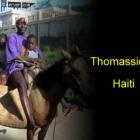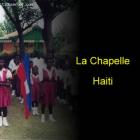ADVERTISEMENT
Race - Haiti Observer Blog
Race, Haiti Observer Blog. Read the following articles about Race
The development of the Jewish community in Haiti
The Jewish legacy in Haiti can be dated as far back as Christopher Columbus and his first crew of explorers. While the famous man himself has often been called a possible Jew, the claim has never been solidly proven. Still, many of his crew members were, including the man who traveled with him to act as his translator, Luis de Torres, who is known as the first person of Jewish heritage to set foot in the Americas.
Following this beginning, Haiti saw its number of Jews dwindle slightly as many people of Jewish descent were expelled following the slave revolt heralded by Toussaint L'Ouverture in 1804. In 1830, the persecution of Jews in Poland and other countries led to a small band of people seeking refuge elsewhere. Then there came the Nazi regime in Germany, which drove out many of the Jewish tribe from all across Europe. It funded the little Haitian country with an influx of those who could afford the travel and documentation for themselves and their families.
Michel Martelly invited to attend NAACP National convention in Florida
The Haitian President, Michel Martelly was invited to participate in U.S. oldest civil rights organization, the National Association for the Advancement of Colored People, (NAACP) national convention in Florida. The convention will run from Saturday July 13, 2013 and continues Wednesday of that same week
The NAACP will mark this year to major events in the history of movement: the 150th anniversary of the Emancipation Proclamation and also the 50th anniversary of the assassination of Mississippi NAACP leader Medgar Evers.
More picture and information about Haiti and its relationship with Black Americans
Founded in 1909, the NAACP is the oldest and largest civil rights organization in the United States. Its objective is to ensure the political, educational, social, and economic equality of rights of all persons and to eliminate race-based discrimination.
Michele Bennett, former First Lady of Haiti and the ex-wife of Jean-Claude Duvalier
Born in 1950, Michele Bennett was the daughter of a Haitian businessman who owned 50,000 acres of land, where he mostly grew coffee. She moved to New York when she was 15 and stayed there until she completed her school from St. Mary's School in Peekskill, New York. Her first job was with a slipper company, where she worked as a secretary.
Her first marriage was with the son of a mulatto officer in 1973, a lock from which Michele gave birth to two children. Michele's first marriage ended five years later, in 1978, post which she took up a career in Public Relations. Her first stint was with a classy hotel called Habitation LeClerc.
Evens Paul revealed Martelly's Protocol favored Mixed Children over Black children in Milot Event
The "Haitian Joudalist" just heard something that is very upsetting. Even worst, it was revealed on May 18, the day we celebrate our flag, a symbol of unity and Black pride.
The Race issue is back in the Haitian society. That is if the information revealed by the Haitian politician and former president of the Democratic United Committee (Komite inite Demokratik, KID) is true. Mr. Evens Paul reported on the popular Radio show "Ranmase" that in an event taking place recently in the city of Milot in the North of the country, the Chief of Protocal responsible to organize the event wanted more children of mixed color in front because too many of them were dark; he ordered the black children to go on the back, moving the light skinned children to the front.
Haiti's Race History
Haiti's ethnic heritage is complex and has evolved well over two centuries, beginning with the original inhabitants, the Arawaks, followed by the Tainos, and finally the Caraibes. The Caraibes named the island Haiti. Although other names were attached to the island, Haiti has persisted as the modern appellation.
Haiti has been subject to four foreign invasions, or colonizations that began race integration. Spain was first, under whom the island was named Hispaniola. They brought slaves from the Congo to work the land. France was the second intruder, renaming Hispaniola Saint Domingue and battling Spain for control of the island. Spain eventually negotiated with France to rule the western half of Hispaniola. By now, Africans became the dominant race, over the indigenous Indians.
Dany Laferriere, How To Make Love To A Negro Without Getting Tired
Haitian born writer Dany Laferrière has spent his career writing things that provoke. From his work in the weekly 'Le Petit Samedi Soir' to his first novel, 'How to make love to a Negro' (1987), Laferrière has carved his success with the blade of controversy, whether real or formulated.
He was born in Port-au-Prince as Windsor Kléber Laferrière on April 13, 1953. After growing up in Petit Goâve, he began working as a journalist until the late 1970's when the weekly he wrote in collaboration with Gaston Raymond most likely led to the murder of the latter. Laferrière felt it best to relocate to Canada.
Jean Price-Mars a Haitian of Stellar Intellect
Jean Price-Mars, leading mind of the Black intelligentsia, assumed prominent roles in the Haitian government as a young person barely out of his teens. The government delegated him Ambassador of Haiti to France, Germany, the Dominican Republic, and U.S. His scientific aptitude led him to study anthropology and medicine, his gift for analysis made him an academician.
Price-Mars worked as teacher, politician, and writer. During his political career, he served as Secretary of State, ran for the presidency, and represented his country as two-term senator. As thinker and writer, he advocated negritude, a pride in being black and the empowerment that meant.
Hannibal Price, Haitian author and diplomat
Born in Jacmel in 1841 to a well-to-do mulatto couple, Hannibal Price began life above the curve. His well-funded education gave him the means to rise high in various respects and he became known as an author as well as a diplomat, having had the post of ambassador from Haiti to the United States for three years from 1890 until his death in 1893.
Price also acted as a Provisional Government Counselor after President Michel Domingue's fall in 1875 and was a serious advocate of Florvil Hyppolite. During the time he played the role of Minister Plenipotentiary to Washington he wrote the book he would be most known for entitled, 'De la Réhabilitation de la Race Noire par la République d'Haïti' (On the Rehabilitation of the Black Race by the Republic of Haiti). This further journey into authorship and the subject matter discussed was said to be in answer to 'Hayti or the Black Republic' by Spenser St. John. Published posthumously, the book sets about to comprehensively show all the possibilities for Haiti if the chains of illiteracy and the consuming practice of vodou were not in existence. It also endeavored to defend the Negro race and present the country to the foreign world in a more friendly light through the discourse of the history and social life of Haiti so voluminously documented within the pages.
Antenor Firmin's Contributions to Bioanthropology
Cap-Haitien-born Anténor Firmin was one of the earliest scholars to write on the subject of negritude. Conceivably the first anthropologist of color, he introduced the notion of human anthropology as allied with the study of racial characteristics.
During the late 1800s, a strain of thinking pervaded U.S. and European intellectual circles, arguing the African race as low on the evolutionary scale in comparison to Caucasians. The French were dominating the conversation of the African race as intellectually inferior, due to misguided assumptions of racial differences. A prominent French author, Count Arthur de Gobineau, published "Essay on the Inequality of Human Races" that posited supremacy of the Aryan people over Africans and other dark-skinned races.
Our objective is to share with you news and information about Haiti and the people of Haiti. Traditions, habits and the way we were or grew are alive in this site. We highly recommend that you Subscribe to our Newsletter and also share with us some of the things that are memorable and made us unique people.

 Thomassique, Haiti
Thomassique, Haiti  Black Friday Shopping Season
Black Friday Shopping Season  Maissade, Haiti
Maissade, Haiti  Haiti tech Summit
Haiti tech Summit  La Chapelle, Haiti
La Chapelle, Haiti